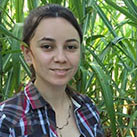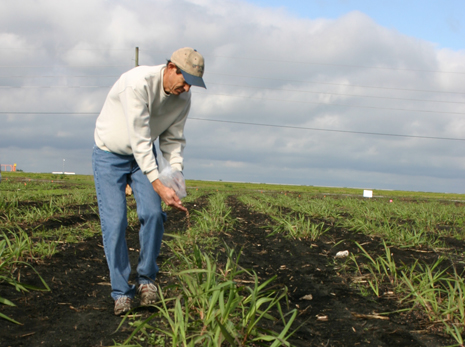Dr. Mabry McCray
Associate Scientist, Agronomy
Specialty: Sugarcane nutrition
My area of specialization is improved nutrient management for sugarcane and rice through cost-effective fertilizer programs that optimize crop production and are environmentally sound. I work on both organic and mineral soils, with each of these major soil types having a range of nutritional questions and problems that need to be addressed. Included in my research and extension efforts are work on leaf nutrient analysis, timing of fertilizer applications, responses to soil amendments and methods of application, evaluation of organic materials and waste by-products for soil application, and crop response to individual nutrients.
Program Areas
-
Research
SUGARCANE AND RICE NUTRIENT MANAGEMENT
Research is being conducted to improve and update soil test calibrations for sugarcane on organic and mineral soils. In recent years pH levels in organic soils of the EAA have generally increased due to soil subsidence which results in shallower soils and increased concentrations of calcium carbonate from the underlying limestone. Also, there has been an 84% increase in sugarcane acreage on mineral soils in Florida in the last 25 years. These changes have emphasized the need to evaluate fertilizer recommendations since these were based on research conducted at least 30 years ago. Recently we developed a new phosphorus calibration for organic soils using the Mehlich 3 extractant which relates well to sugarcane yield across a wide pH range. The new calibration has positive economic and environmental impacts by closely matching phosphorus fertilizer applications with crop requirement. We have also developed a new soil test silicon calibration for calcium silicate amendment applications for sugarcane grown on organic soils. For years growers have used calcium silicate as an amendment for soils low in available silicon because of the requirement sugarcane and rice have for this nutrient, and this new calibration assists growers in making cost-effective decisions regarding amendment applications.
Several studies are currently being conducted to improve and update other soil test calibrations. The elemental sulfur study on organic soils has demonstrated sugarcane yield response to sulfur at pH>7.2. Nitrogen fertilizer recommendations for sugarcane on mineral soils were revised in 2016. The revised recommendations allow for differences in crop year and also have an allowance for excessive rainfall. Best management practices for nitrogen fertilization include split applications and a maximum of 50 lb soluble N/acre/application to ensure that groundwater and surface water are protected from leaching of excessive nitrogen. Other studies include potassium rate on organic and mineral soils, phosphorus rate on mineral soils, and silicon rate on mineral soils. We are also working with growers to evaluate organic amendments for mineral soils such as sugarcane mill mud and compost to determine viable alternatives for increasing organic matter content and to improve sustainable productivity on low-fertility sands. At this time only silicon and iron fertilization are recommended for rice and these are based on pre-plant soil tests for those nutrients. Evaluations have not determined a requirement for fertilization with other nutrients for rice grown on organic soils but this research is continuing.
Leaf nutrient analysis can be useful as a complement to soil testing for nutrient management decisions. Results of the leaf nutrient survey and DRIS fertilizer supplement study have been used to provide growers with the information to effectively use leaf nutrient analysis in their operations. New leaf nutrient guidelines show growers where the concentration of each nutrient is on a growth response curve. By encouraging sugarcane growers to use leaf analysis to adjust the next fertilizer or amendment application, application costs are minimized and growers can target specific adjustments in nutrient application that can either reduce costs or increase production. We are working to provide nutrient management solutions that are cost-effective and sustainable through long-term research and effective communication with growers.
-
Extension
My extension program is comprised of two program areas with the overall goal of providing growers and the public in south Florida with the latest nutrient management information so that cost-effective and environmentally sound decisions can be made regarding nutrient applications. I work closely with the Everglades Soil Testing Laboratory Oversight Committee, the Sugarcane/Rice Focus Team, and extension agents in Palm Beach and Hendry Counties to work towards that goal and to make sure we are addressing concerns of growers and other clients. Information regarding nutrient management is disseminated through web-based electronic extension publications (EDIS), workshops, seminars, field days, and individual visits with growers and other clients. Specific program areas are (1) improving nutrient management programs for south Florida sugarcane and rice growers, and (2) providing soil nutrient analytical services and recommendations for growers and the public in south Florida.
Situation
Sugarcane is grown on approximately 410,000 acres in south Florida, in Palm Beach, Hendry, Glades, and Martin counties. Sugarcane is the most valuable row-crop in Florida with an annual value of $1 billion and returns from sugarcane make up 78% of Florida’s cash receipts from field crops. Rice is an important rotation crop for sugarcane and up to 20,000 acres of rice are grown annually.
Approximately 78% of Florida’s sugarcane acreage is produced on organic soils and the remainder is grown on mineral soils. There are a wide variety of soil conditions in growers’ fields including soil pH ranging from strongly acid to strongly alkaline and organic matter content ranging from under 1% to approximately 90%. With soil subsidence, many organic soils are becoming shallower, which in some cases presents problems with increased pH, micronutrient deficiencies, and decreased rooting depth. Mineral soils in south Florida inherently have very low organic matter content and very low nutrient and water-holding capacities. Mineral soils of south Florida require diligent management of soluble nutrients such as nitrogen and potassium so that crop nutrient requirements are met as efficiently as possible. In addition, growers in the Everglades Agricultural Area (EAA) are required to follow best management practices (BMPs) designed to meet phosphorus load reduction requirements for drainage water. Growers are able to select appropriate practices for their specific soils and farms, so that sediment and phosphorus in drainage water leaving a specific farm are minimized. With the range of soil conditions encountered, it is vital that growers have an understanding of appropriate nutrient management BMPs that consider both economics and environment.
A complicating factor for growers is that of increased costs of production which emphasizes the need for close scrutiny of all input costs. Fertilizer costs have increased dramatically in recent years related to increased worldwide demand and increased fuel costs. With increased economic and environmental pressures it is important that growers have information that is up-to-date and relevant for their specific situations. My extension program is designed to provide growers with easy access to this information.
Sugarcane and Rice Nutrient Management
The objectives of this extension program are to:
(1) Promote increased nutrient use efficiency and cost-effective use of fertilizers and amendments by providing growers with effective nutrient management information. (2) Promote best management practices that enable growers to achieve optimum economic yields while protecting water quality.
Meetings with the Sugarcane Industry Research Committee and the Florida Rice Growers in addition to individual grower consultations are used to identify research and extension priorities. Seminars, workshops, and field days are used to present research results and the latest information about best management practices, and to hear growers’ concerns about crop nutrition. EDIS documents are published to provide growers with current information regarding nutrient management and best management practices.
-
Graduate Students
Graduate research is conducted under the supervision of Dr. Mabry McCray. Currently this research includes investigations into relationships of soil and plant phosphorus and potassium with sugarcane grown on mineral soils. Also international short-term scholars are provided with an opportunity to learn methods of laboratory and field research and about agriculture in south Florida.

Joaquin Saavadra, MS Student
Research Topic: Effect of different phosphorus and potassium fertilizer rates on sugarcane nutrient content for four mineral soils adjacent to the Everglades Agricultural AreaJoaquin is from Honduras and is pursuing a Master’s degree in agronomy. He was a short-term scholar from Zamorano University for four months in 2013. He started his graduate program in January 2016. His research consists of two pot experiments with sugarcane. These experiments examine four rates of phosphorus and potassium on four mineral soils with four replications. One primary objective of the research is to develop relationships between soil phosphorus and leaf phosphorus and between soil potassium and leaf potassium using various soil extractants to determine the extractants that work best.
Aline de Camargo Santos, MS Student
Aline is working on assessment of nitrogen sufficiency of sugarcane in shallow organic soils, and sugarcane yield resonse to nitrogen fertilizer in these soils. Her advisor is Dr. Mabry McCray in the Agronomy Department. -
Everglades Soil Testing Laboratory
The EREC Everglades Soil Testing Laboratory was established in 1938 and has the mission of conducting soil testing to provide growers with fertilizer recommendations primarily for crops grown on organic soils. These soils are much different than mineral soils and so require analytical methods developed specifically for the Everglades Agricultural Area (EAA). Some of the specific analyses offered by the laboratory were developed at the EREC and are not routinely available at other laboratories. These methods are based on field and laboratory research with crops grown on organic soils to develop nutrient calibrations that provide growers with fertilizer recommendations that are economically and environmentally sound.
The objectives of the Everglades Soil Testing Laboratory are to:
(1) Provide soil analytical services for growers and the general public in and adjacent to the EAA with soil analysis calibrated for local crops and soils and that are competitive in cost with private laboratories.
(2) Continually improve and update the methods, calibrations, and efficiency of the laboratory.
(3) Provide growers, individuals, and regulatory agencies with effective nutrient management information including best management practices.
-
Publications
- McCray, J. M., and R. W. Rice. 2023. Nutritional requirements and fertilizer recommendations for Florida sugarcane. Florida Cooperative Extension Service Fact Sheet SS-AGR-228. UF/IFAS Electronic Data Information Source (EDIS) Database. Available at https://edis.ifas.ufl.edu/publication/SC028
- McCray, J. M. 2022. Phosphorus fertilizer recommendations for sugarcane on Florida mineral soils. Florida Cooperative Extension Service Fact Sheet SS-AGR-466. UF/IFAS Electronic Data Information Source (EDIS) Database. Available at https://edis.ifas.ufl.edu/publication/SC108
- McCray, J. M. 2022. Potassium fertilizer recommendations for sugarcane on Florida mineral soils. Florida Cooperative Extension Service Fact Sheet SS-AGR-468. UF/IFAS Electronic Data Information Source (EDIS) Database. Available at https://edis.ifas.ufl.edu/publication/SC110
- McCray, J. M. 2022. Calcium silicate recommendations for sugarcane on Florida mineral soils. Florida Cooperative Extension Service Fact Sheet SS-AGR-467. UF/IFAS Electronic Data Information Source (EDIS) Database. Available at https://edis.ifas.ufl.edu/publication/SC109
- Mylavarapu, R., Y. Li, M. Silveira, C. Mackowiak, and J. M. McCray. 2021. Soil-test-based phosphorus recommendations for commercial agriculture production in Florida. Florida Cooperative Extension Service Fact Sheet SL486. UF/IFAS Electronic Data Information Source (EDIS) Database. Available at http://edis.ifas.ufl.edu/publication/SS699.
- Cherry, R., J. M. McCray, H. Sandhu, and M. Karounos. 2021. Abundance of soil insect pests in Florida sugarcane. Florida Cooperative Extension Service Fact Sheet ENY-2058. UF/IFAS Electronic Data Information Source (EDIS) Database. Available at http://edis.ifas.ufl.edu/publication/IN1313.
- McCray, J. M., and S. Swanson. 2020. Soil organic matter impacts on sugarcane production on Florida mineral soils. Florida Cooperative Extension Service Fact Sheet SS-AGR-442. UF/IFAS Electronic Data Information Source (EDIS) Database. Available at http://edis.ifas.ufl.edu/publication/SC441.
- McCray, J. M. 2019. Potassium fertilizer recommendations for sugarcane on Florida organic soils. Florida Cooperative Extension Service Fact Sheet SS-AGR-428. UF/IFAS Electronic Data Information Source (EDIS) Database. Available at http://edis.ifas.ufl.edu/publication/AG428.
- McCray, J. M. 2019. Elemental sulfur recommendations for sugarcane on Florida organic soils. Florida Cooperative Extension Service Fact Sheet SS-AGR-429. UF/IFAS Electronic Data Information Source (EDIS) Database. Available at http://edis.ifas.ufl.edu/publication/AG429.
- McCray, J. M., R. A. Gilbert, R. W. Rice, and D. C. Odero. 2019. Nutrient requirements for sugarcane production on Florida muck soils. Florida Cooperative Extension Service Fact Sheet SS-AGR-226. UF/IFAS Electronic Data Information Source (EDIS) Database. Available at http://edis.ifas.ufl.edu/publication/SC026.
- McCray, J. M., K. T. Morgan, and L. Baucum. 2019. Nitrogen fertilizer recommendations for sugarcane production for sugar on Florida sand soils. Florida Cooperative Extension Service Fact Sheet SS-AGR-401. UF/IFAS Electronic Data Information Source (EDIS) Database. Available at http://edis.ifas.ufl.edu/publication/SC101.
- McCray, J. M., R. W. Rice, and A. L. Wright. 2021. Phosphorus fertilizer recommendations for sugarcane production on Florida organic soils. Florida Cooperative Extension Service Fact Sheet SS-AGR-348. UF/IFAS Electronic Data Information Source (EDIS) Database. Available at http://edis.ifas.ufl.edu/publication/SC091.
- McCray, J. M., R. W. Rice, and L. E. Baucum. 2021. Calcium silicate recommendations for sugarcane on Florida organic soils. Florida Cooperative Extension Service Fact Sheet SS-AGR-350. UF/IFAS Electronic Data Information Source (EDIS) Database. Available at http://edis.ifas.ufl.edu/publication/SC092.
- Wright, A. L., E. A. Hanlon, and M. McCray. 2018. Fate of phosphorus in Everglades agricultural soils after fertilizer application. Florida Cooperative Extension Service Fact Sheet SL290. UF/IFAS Electronic Data Information Source (EDIS) Database. Available at http://edis.ifas.ufl.edu/publication/SS503.
- McCray, J. M., I. V. Ezenwa, P. R. Newman, and R. W. Rice. 2021. Sugarcane leaf tissue sample preparation for diagnostic analysis. Florida Cooperative Extension Service Fact Sheet SS-AGR-259. UF/IFAS Electronic Data Information Source (EDIS) Database. Available at http://edis.ifas.ufl.edu/publication/SC076.
- McCray, J. M., and R. Mylavarapu. 2021. Sugarcane nutrient management using leaf analysis. Florida Cooperative Extension Service Fact Sheet SS-AGR-335. UF/IFAS Electronic Data Information Source (EDIS) Database. Available at http://edis.ifas.ufl.edu/publication/AG345.
- McCray, J. M., R. W. Rice, I. V. Ezenwa, T. A. Lang, and L. Baucum. 2019. Sugarcane plant nutrient diagnosis. Florida Cooperative Extension Service Fact Sheet SS-AGR-128. UF/IFAS Electronic Data Information Source (EDIS) Database. Available at http://edis.ifas.ufl.edu/publication/SC075.

Contact
Dr. J. Mabry McCray
Everglades Research & Education Center
Wedgworth Lab. Bldg. Rm. #113
3200 East Palm Beach Road
Belle Glade, FL 33430
Phone: (561) 993-1518
Email: jmmccray@ufl.edu
- Agronomy Department
- Sugarcane DRIS Calculator download (40KB zip).
This is an Excel spreadsheet that converts sugarcane leaf nutrient concentrations into DRIS indices which provides additional information about nutrient balance.
